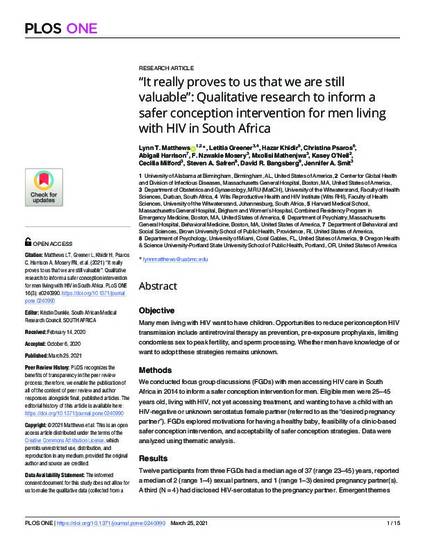
- HIV infections -- South Africa -- Treatment,
- HIV -- Case studies,
- Real time monitoring
Objective: Many men living with HIV want to have children. Opportunities to reduce periconception HIV transmission include antiretroviral therapy as prevention, pre-exposure prophylaxis, limiting condomless sex to peak fertility, and sperm processing. Whether men have knowledge of or want to adopt these strategies remains unknown.
Methods: We conducted focus group discussions (FGDs) with men accessing HIV care in South Africa in 2014 to inform a safer conception intervention for men. Eligible men were 25–45 years old, living with HIV, not yet accessing treatment, and wanting to have a child with an HIV-negative or unknown serostatus female partner (referred to as the “desired pregnancy partner”). FGDs explored motivations for having a healthy baby, feasibility of a clinic-based safer conception intervention, and acceptability of safer conception strategies. Data were analyzed using thematic analysis.
Results: Twelve participants from three FGDs had a median age of 37 (range 23–45) years, reported a median of 2 (range 1–4) sexual partners, and 1 (range 1–3) desired pregnancy partner(s). A third (N = 4) had disclosed HIV-serostatus to the pregnancy partner.
Conclusion: Men living with HIV expressed interest in safer conception and willingness to attend clinic programs. Imprecise prevention counseling messages make it difficult for men to conceptualize risk reduction. Effective safer conception programs should embrace clear language, e.g. undetectable = untransmittable (U = U), and support multiple approaches to serostatus disclosure to pregnancy partners.
Copyright: © 2021 Matthews et al.
This work is licensed under a Creative Commons Attribution 4.0 International License.
